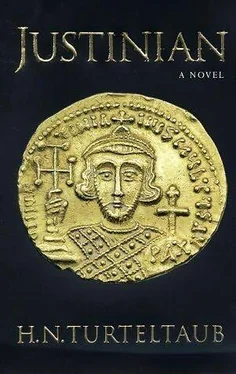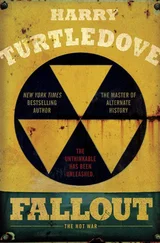Harry Turtledove - Justinian
Здесь есть возможность читать онлайн «Harry Turtledove - Justinian» весь текст электронной книги совершенно бесплатно (целиком полную версию без сокращений). В некоторых случаях можно слушать аудио, скачать через торрент в формате fb2 и присутствует краткое содержание. Жанр: Историческая проза, на английском языке. Описание произведения, (предисловие) а так же отзывы посетителей доступны на портале библиотеки ЛибКат.
- Название:Justinian
- Автор:
- Жанр:
- Год:неизвестен
- ISBN:нет данных
- Рейтинг книги:3 / 5. Голосов: 1
-
Избранное:Добавить в избранное
- Отзывы:
-
Ваша оценка:
- 60
- 1
- 2
- 3
- 4
- 5
Justinian: краткое содержание, описание и аннотация
Предлагаем к чтению аннотацию, описание, краткое содержание или предисловие (зависит от того, что написал сам автор книги «Justinian»). Если вы не нашли необходимую информацию о книге — напишите в комментариях, мы постараемся отыскать её.
Justinian — читать онлайн бесплатно полную книгу (весь текст) целиком
Ниже представлен текст книги, разбитый по страницам. Система сохранения места последней прочитанной страницы, позволяет с удобством читать онлайн бесплатно книгу «Justinian», без необходимости каждый раз заново искать на чём Вы остановились. Поставьте закладку, и сможете в любой момент перейти на страницу, на которой закончили чтение.
Интервал:
Закладка:
How gorgeous the bishops were as they stood to hear my father speak from the ambo of the great church to open the synod, how gorgeous and how varied. For though they were all Christians, all part of God's holy and universal church, yet they were also from many lands, with robes of different cut and many colors so that, assembled there, they put me in mind of Joseph's coat.
As my father spoke, setting forth the reasons for abandoning the false doctrine of the one energy and one will in Christ, his words came echoing back from the high dome of the church. When the Justinian for whom I am named first saw that dome, which his architects created in accordance with his vision, he cried out, "Solomon, I have beaten you!"
Thanks to the wicked Babylonians, we have not the chance to compare Solomon's temple to the church of the Holy Wisdom. By the awed looks on the faces of the bishops- especially those from beyond the borders of the Roman Empire- who gaped at the wonder Justinian had wrought, most would have agreed with him.
I was particularly struck by the amazement on the face of one man, a plump, fair-haired latecomer from somewhere in the west who, as luck had it, had been on pilgrimage to Jerusalem when my father sent out the summons for the synod, and who came up to Constantinople to take part. You would have thought he found himself unexpectedly transported to heaven, not in a human church, no matter how magnificent. I wondered in what sort of drafty cow barn he did his own preaching.
His robe was among the plainest there, being merely dark blue wool, but, as he had been a pilgrim before coming to the Queen of Cities, that said nothing as to the wealth of his see. He joined with the other bishops in applauding my father. After my father stepped down from the ambo, George the ecumenical patriarch replaced him there. He proceeded to make the same points my father had, but took four times as long doing it, as he cited every relevant Scriptural text and passage from the holy fathers to bolster his position.
Most of the bishops listened attentively. Some were scowling: they, I guessed, were those who still favored monotheletism, and who were mentally preparing texts and passages of their own with which to defend the doctrine in the sessions that lay ahead. Even as a boy of eleven, I could have told them they were wasting their efforts. When the Emperor convenes an ecumenical synod of the church, it ratifies the doctrine he has established. So it has been since the days of the first Constantine; so it shall always be. The Emperor, after all, being God's vicegerent on earth, is specially concerned with maintaining the faith.
Learned though it was, I found George's oration tedious. Watching the bishops, trying to guess who would cling to the doctrine of the one will and energy and who would gladly abandon it, was a more interesting game. And then my eye fell once more upon the pilgrim bishop from the distant west. His jaws were working furiously as George spoke. I thought he was about to burst out in a tirade against the holy ecumenical patriarch, thereby disrupting the synod.
Then he tilted his head to one side and spat something onto the floor of the great church. That done, he popped something else into his mouth, whereupon his jaws began working once more. Chew, spit,… chew, spit,.. After several of these cycles, I realized he was eating salted olives.
I had all I could do to hold my face still. Here we were in the grandest shrine ever built by man, on the solemn occasion of an ecumenical synod- only the sixth such in nearly seven centuries of Christendom- and this backwoods bishop reckoned nothing more important than the snack he had brought with him. Had my father stayed and seen him, he would have been less amused than I was.
At last, George droned to a halt, having run out of citations to hurl at the clerics assembled before him. He had not noticed the hungry bishop; like my pedagogue, he believed the most perfect reality lay in ink on paper.
The pious bishops broke up into knots. The murmur of theological disputation rose up into the dome of the church of the Holy Wisdom. I turned and caught Myakes' eye. "Do you speak Latin?" I asked him.
"A little, Prince," he answered; I had outgrown "Goldentop." "Soldiers, we use it some."
"Good," I said, and pointed to the peckish bishop. "I want to meet that man, and he may well speak no Greek. You will accompany me." I was learning to command, even so young.
Accompany me he did. We steered our way through the assembled prelates, some of whom moved toward me to give me their views on the one or two wills and energies, presumably in the hope these would reach my father (a wasted hope even if realized, his mind being unalterably made up), while others drew back from Myakes' shield and spear. The western bishop looked up in surprise at finding himself my target.
He had manners. He bowed and said, "Good day, Prince Justinian," in Greek not too vile. He must have learned it on his long journey from the barbarous west.
"Good day," I answered. "Tell me your name, and where you are from."
He bowed again. "I am Arculf, bishop of Rhemoulakion, a small city in Gaul," he answered, and paused to eat another couple of olives.
I saw more pits than I had expected on the ground by his feet. "Do you do nothing but eat?" I asked him, pointing down to them.
The Gallic bishop flushed; as he was so fair, you could watch the color mount from his throat to the very top of his head, exposed by his tonsure. He was so flustered, he forgot his Greek, and spluttered out something in Latin. I glanced over to faithful Myakes, who translated for me: "He is embarrassed, for you have seen what a glutton he is. He fights the sin as best he can, but that best is not yet good enough."
"Thank you," Bishop Arculf told him. He went on for himself, in Greek once more, "I pray in Jerusalem at the church of the Holy Sepulcher for God to take this sin from me. It does not happen yet." He rolled his eyes mournfully. "Now I pray here, too, at the church of the Holy Wisdom. Sooner or later, God will hear me." His round face filled with serene faith.
"How do you stand on the question of Christ's wills and energies?" I asked. I was jealous he had been to Jerusalem, which the followers of the false prophet stole from us in the days of my great-great-grandfather.
"I believe with your father the Emperor of the World," Arculf said. "Christ has and must have two wills, two energies. All Christians in the west believe this."
"What of Pope Honorius?" I asked. "He agreed with Sergios of Constantinople that Christ has only one will."
Arculf looked at me in a new way before he answered. "You know these things," he said, almost accusingly. Before, he had been polite to a boy who was a prince; now he saw he had to weigh his words, as if to a man. I looked smug. At my side, Myakes looked proud. He had no learning to speak of, but admired mine. Arculf went on, "If Pope Honorius says this, if the holy ecumenical synod decides he says this, let him be anathema with others who say this."
"I agree," I told him. "Let all who confess one energy and one will be anathema. Let their bones be dug up." He did not understand that, not even after Myakes did his best to turn it into Latin. I realized it was Constantinopolitan slang, not ordinary Greek, and explained: "It means, 'Down with them. No mercy to them.'\a160"
Little did I dream then that one day the worthless, fickle city mob would be screaming for my bones to be exhumed. Well, the wretches who led and misled them are mostly dead now, and those who still live shall not live much longer.
"\a160'Let their bones be dug up.'\a160" Arculf fixed the phrase in his memory. He said, "You are very sure of the right dogma, Prince."
"Of course I am," I told him, surprised he was surprised. "My father has decreed it, the ecumenical patriarch has agreed to it, now the holy ecumenical synod will ratify it. It must be true."
Читать дальшеИнтервал:
Закладка:
Похожие книги на «Justinian»
Представляем Вашему вниманию похожие книги на «Justinian» списком для выбора. Мы отобрали схожую по названию и смыслу литературу в надежде предоставить читателям больше вариантов отыскать новые, интересные, ещё непрочитанные произведения.
Обсуждение, отзывы о книге «Justinian» и просто собственные мнения читателей. Оставьте ваши комментарии, напишите, что Вы думаете о произведении, его смысле или главных героях. Укажите что конкретно понравилось, а что нет, и почему Вы так считаете.












